The emblem of the axe was demoted during restructuring of the post-initiatory degrees in 1881. It was a part of the initiatory degree and was viscerally intertwined with the most visible of our emblems: the three links.
In The Brotherhood by Beharrell (1861), the author detailed the meaning of the emblems of our order (prior to the 1881 restructuring) and said about “The Ax and Three Links” as follows:
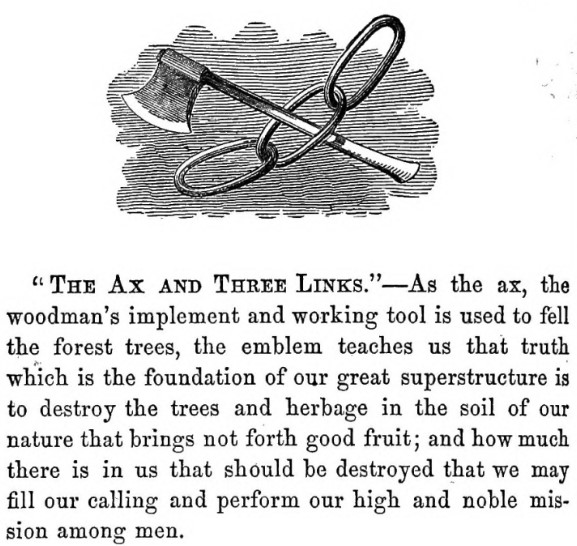
Some time prior to 1842, the words taken from an address given by Rev. D.D. Smith describe the Axe as an emblem as follows:
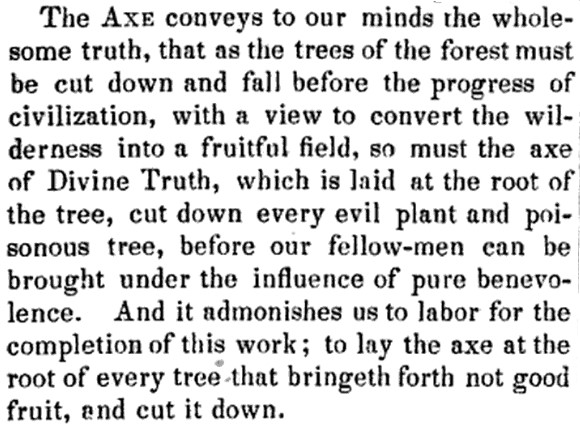
There is very good reason that the “Ax” or “Axe” was part of our initiatory degree. It is fine to build a grand cause, but without constantly weeding and clearing the way, the grand cause will collapse under the undue influence in all of us. It’s easy to see how selfishness and hunger for power and control, which is at the root of all our brains, is ever-present and must constantly be seen for what it is and ignored; recognized and removed by our better self from our lesser self.
In the 1800s, any man entering Odd Fellowship, or today, man or woman, should be aware that if we are to avoid disaster (as our order is very much in danger of collapse in the near future as we all know), we must recognize the part of our human nature which allows the “trees and herbage in the soil of our nature that brings not forth good fruit” and to labor to destroy it. In other words, we must not just recognize what there is to work on in ourselves, but also that we work on it vigorously. These are no flowery sentiments; they point at the harshness of reality and the neglectful possibility of doom unless we pick up the axe and get to work. We need to be vigilant and recognize the truth that we need to destroy the thick of things when we conduct meetings, invite new members, to visit the sick, to hold heart in hand, to save our future and our order.
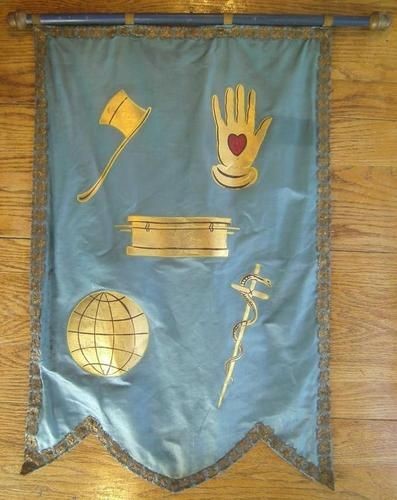
If we recognize how our order was established to have the axe be so prominent in our own formation and establishment, we can see that they really meant for it to be first and foremost. They had no illusions of its importance.
When I was a new member, I can tell you that there have been several times that I felt as though I was faced with a thick forest of unknowable depths of the issues facing my lodge and our order. And it may not be my place to say, but I have seen older members “not bringing forth good fruit” leaving me feeling nit-picked, stymied and barred from doing the things we are asked to do by our grand lodge to increase membership and to do the very things that Odd Fellows do. It is a challenge and I recognize it. And it is for me to also use the axe to clear away my resistance to how things are. I must work with the brothers and sisters around me so that we may all move forward together.
Every time I hear, “Well that’s a great idea, but you’re going to have to be the one to do it.” is like setting me in front of a thick overgrown forest with an axe and being told to go for it—alone. And I pick up the axe and start to clear away the brush, the thorny vines and imposing trees; it is my own hard feelings that I must clear away.
There should be something in our order that reminds everyone, new or senior in the order, that we all have a part of us that does not bear good fruit and that it should be destroyed. Beharrell doesn’t use the word “destroy” because it sounds funny or as an exaggeration; he means the word “destroy” because he really means it.
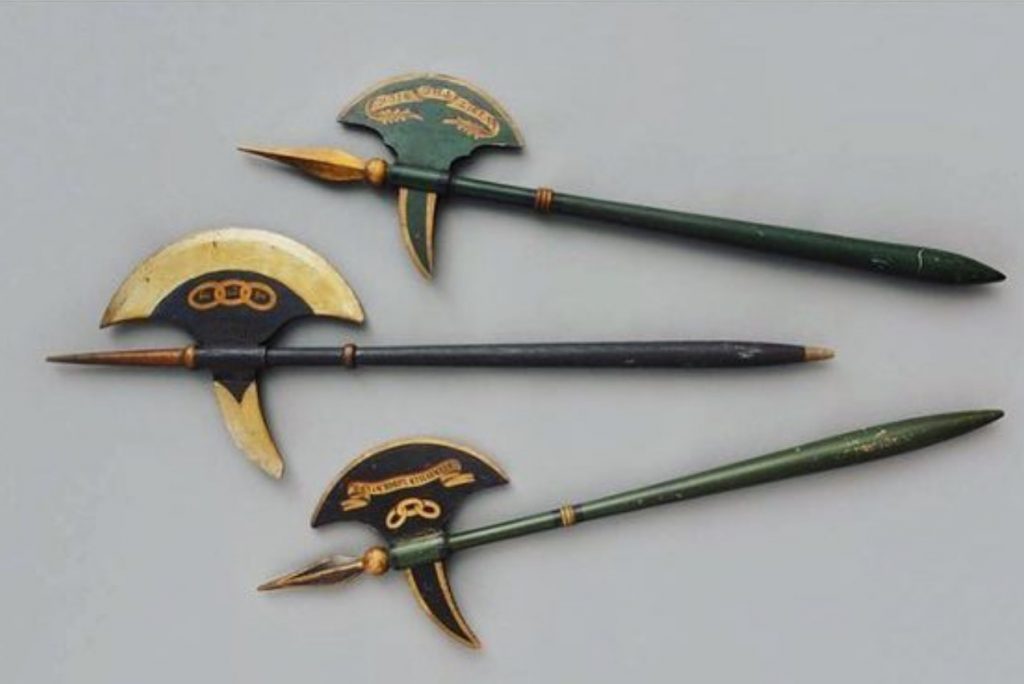
The older members should be destroying whatever keeps them from inviting new members and mentoring them to be the future leaders of their lodge. They should be clearing away anything in the soil of their nature that doesn’t bear fruit for themselves. In themselves, they need to clear the way for others. They need to clear their own way forward and destroy their own cynicism and apathy. They need to make the path with the axe. The axe is for themselves and for others.
The axe is proof of imperfection which is hard for many to accept.
The presence of the axe is humility which is hard for many to embrace.
In my experience of advising and coaching people, whether in my previous capacity with Santa Monica College working for the Small Business Development Center and coaching small business owners or working one-on-one as a coach for people who are doing charitable works, this process of ridding ourselves of what doesn’t work starts with awareness. Without awareness, there becomes an invisible pretense that there is nothing to see, nothing to act upon and nothing to even discuss.
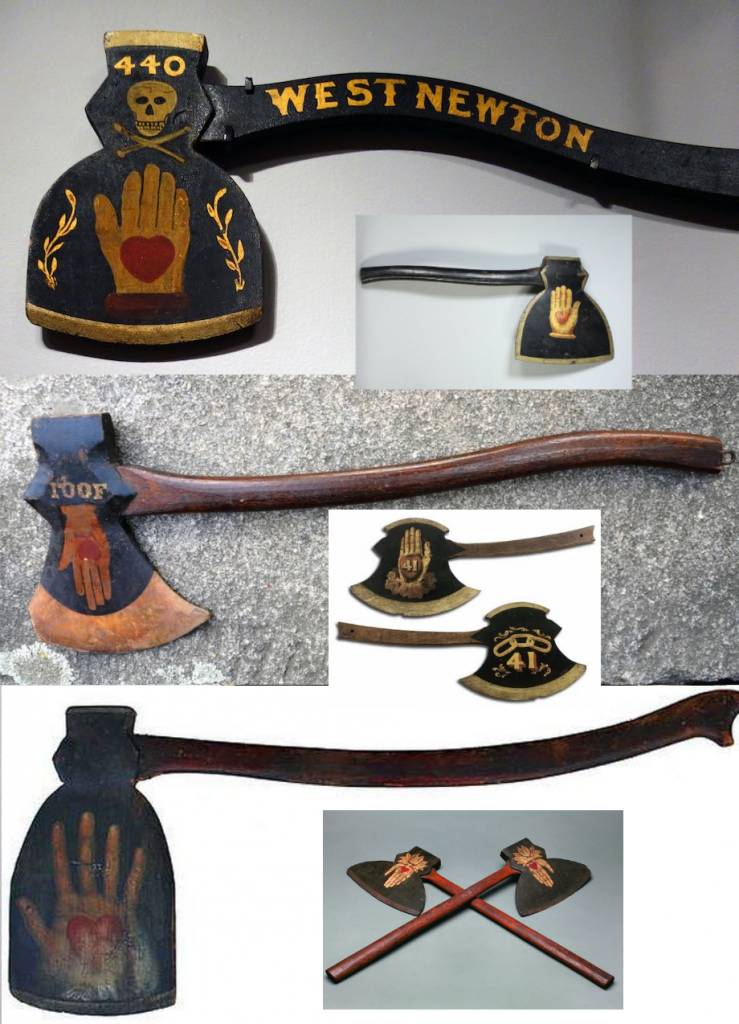
I believe that when the axe was removed from our initiatory degree, that we lost the crucial fundamental awareness at the onset of Odd Fellowship, that we all, myself included, have things about us that do not work and that we need to be aware, proactive and responsible for it. And not just for ourselves alone but for our community and our order.
Everyone around us deserves our best work and without the axe we can unconsciously pretend we are doing our best. Without the axe, there is no longer a fundamental assumption that there is something to destroy. Without the axe, there is nothing to work on. Without the axe, we get to pretend we are perfect and that there is nothing to improve.
If you ask me, this lack of awareness that we are imperfect and that it is parts of any of us that need to be destroyed is what led to the removal of the axe. The only word I can imagine to describe what removed the axe was vanity.
To support the idea of removing the axe as an emblem, everyone must have been thinking how great our order has become and that we can do no wrong by making whatever changes “for the good of the Order.” The removal of that axe preceded our largest numbers and then a nearly catastrophic decline. What was once more than a million is now nearly a hundredth of a million and shrinking.
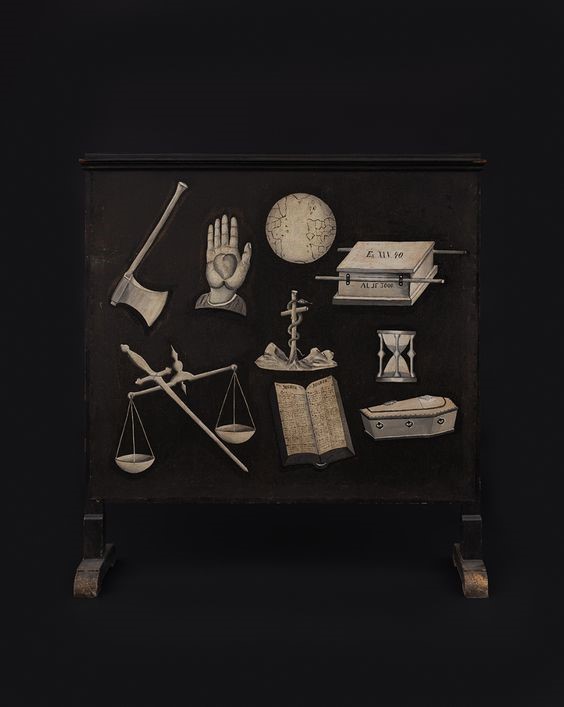
Is it really any wonder as I look at trestle boards and degree banners of the early days of the IOOF that the axe is the top-left most item? The axe was first from left to right and from top to bottom. The axe was first and foremost for initiation. The axe was there to teach that no one is perfect. The axe was there to say we are human and make mistakes when we are not vigilant. The axe was there to say that it is our job, indeed it should be a priority, if we are to do our best for our community and our order, to be aware that there is something to be cleared away that can cloud our thinking and harden our hearts and that they must be destroyed today and when they grow back continually.
Without the axe to remind us of these things, how are we to recognize where we are weakest and how can we spot our own self-sabotage? How can we not use the axe to recognize that we should be always caution in our dealings? How are we to remain humble if we aren’t reminded that we may bear fruit that is not good? How can we “destroy the trees and herbage in the soil of our nature” without the axe?
As Beharrell says in summation, the axe is to remind us of “how much there is in us that should be destroyed that we may fill our calling and perform our high and noble mission among men.”
Without the axe, will we collapse in the future like so many fraternities…quietly…lost to the pages of history?
